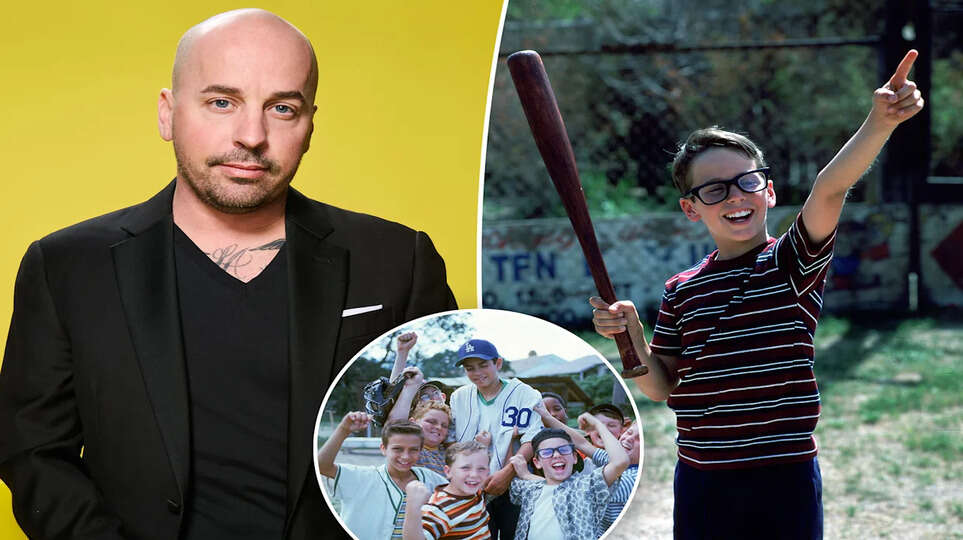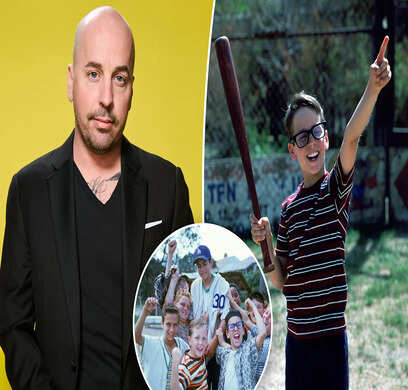The Sandlot's Squints: Why Chauncey Leopardi Stepped Back from the Hollywood Business
Former child actor Chauncey Leopardi, famously known as "Squints" from The Sandlot, opens up about his frustration with the "business side of Hollywood," his decision to step back from the limelight, and his current focus as a father and cannabis entrepreneur.


Introduction
Chauncey Leopardi, the actor whose iconic character Michael "Squints" Palledorous in the 1993 classic The Sandlot cemented his place in '90s pop culture, has been open about his decision to step back from the high-pressure world of Hollywood. While he still holds fond memories of his time on set—particularly the unique, "summer camp" experience of filming The Sandlot—his frustration ultimately lay with the demanding, politically charged business side of the acting industry, which he felt overshadowed the passion for the craft. Now a father of five and an entrepreneur, Leopardi has successfully navigated the transition away from full-time acting, finding a new, equally passionate pursuit outside the traditional entertainment machine.
The Lure and Limits of Child Stardom
Leopardi's acting career began almost by chance after he booked a commercial in Dallas, which quickly led him and his mother to Los Angeles where he secured a string of memorable roles. Beyond The Sandlot, he appeared in films like Father of the Bride and Casper, and had recurring roles on beloved television series such as Boy Meets World, 7th Heaven, and the cult hit Freaks and Geeks, where he played the bully Alan White. This early success gave him a unique perspective on Hollywood at a young age, but it also exposed him to the elements of the business he grew to dislike.
The grinding pace of auditions, the constant pressure, and the realization of the industry's often arbitrary nature eventually led Leopardi to question his passion. For a child, the difference between acting as a fun summer job and acting as a lifelong, competitive career became clear.
The Frustration with the "Business Side"
The main driving force behind Leopardi's departure from the Hollywood mainstream wasn't a lack of opportunity or success, but a deep-seated frustration with the machine itself. He has stated that while he loved the actual experience of acting and being on set, he "didn't necessarily like the business side of Hollywood." This includes the relentless grinding required for auditions and the difficult, often political, landscape where "powerful people in high places" held sway over who and what was popular.
Leopardi's experience echoes that of many child actors who find the transition into adult roles—and the business that supports them—challenging. The dynamic shifts around age 15 or 16, and the industry’s focus changes. He felt that the constant auditioning and industry politicking reached a point where he genuinely questioned, "Do I even like doing this? Is it something I'm truly passionate about?"
A Balanced Transition Away from the Limelight
One of the key factors that helped Leopardi successfully transition away from the spotlight and avoid the pitfalls faced by many troubled child stars was his ability to maintain a life outside of the industry. He was "in the industry but not completely in the industry," which allowed him to maintain a degree of normalcy and a balanced perspective. This balance helped him to avoid some of the more destructive paths taken by his peers.
After his run of memorable 90s roles, Leopardi scaled back his acting work significantly, choosing his roles sporadically. While he reprised his role as Squints for the direct-to-video sequel The Sandlot: Heading Home in 2007, and appeared in the 2019 music video for Logic and Eminem's "Homicide," his primary focus shifted.
Fatherhood, Family, and a New Business Passion
Today, Chauncey Leopardi's life is centered around his family and his entrepreneurial venture. He is a father of five and a dedicated husband, prioritizing his role as a dad and a husband over the demands of a full-time acting career.
His new professional life is rooted in a completely different kind of plant: cannabis. Leopardi has publicly expressed that it is "definitely my passion," having "fell in love with the plant." He is the driving force behind a growing cannabis operation and has launched his own brand, fittingly named Squintz, which offers products with names that playfully reference his most famous role, such as "Wendy Peffercorn." While he still lives in Los Angeles and occasionally appears at Sandlot conventions and signings, his day-to-day focus is on his family and his thriving cannabis business.
The Enduring Legacy of Squints
Despite moving away from Hollywood's business structure, Leopardi continues to embrace the enduring legacy of The Sandlot. The film's modest initial box office success exploded into a cult classic on VHS and later on streaming, making it a beloved rite of passage for generations.
He frequently reunites with his former castmates, often alongside Patrick Renna (Ham) and Tom Guiry (Smalls), for events and conventions. These reunions are described as "getting together with family," highlighting the lasting bond formed during that famous summer of 1962, which stands in stark contrast to the cutthroat business he left behind. The ability to connect with fans and celebrate the film's legacy on his own terms is a much more gratifying experience than the struggle for roles and the endless auditions of his childhood.
FAQ's
Q: Why did Chauncey Leopardi leave Hollywood?
A: Chauncey Leopardi did not entirely quit acting, but he significantly stepped back from the Hollywood mainstream due to growing frustration with the intense and sometimes arbitrary "business side" of the industry, including the constant grind of auditions and industry politics. He reached a point where he questioned whether acting was something he was truly passionate about as a full-time career.
Q: What is Chauncey Leopardi doing now?
A: Chauncey Leopardi is currently a father of five and an entrepreneur. He has launched his own cannabis brand called Squintz (named after his famous Sandlot character), which he has stated is his true professional passion. He occasionally still acts and attends The Sandlot cast reunions and fan conventions.
Q: Did Chauncey Leopardi regret his acting career?
A: No, Leopardi has expressed fond memories of his time as a child actor, particularly the "summer camp" experience of filming The Sandlot. His issue was specifically with the demanding business and politics of Hollywood, not the act of performing itself. He attributes his ability to move away successfully to maintaining a life outside the industry, which helped him "transitioned better than a lot of child actors."
Q: Is Chauncey Leopardi still in contact with The Sandlot cast?
A: Yes, Chauncey Leopardi remains in regular contact with many of his former Sandlot castmates, including Patrick Renna ("Ham") and Tom Guiry ("Smalls"). They often reunite for fan events and conventions, which they describe as a family reunion.
Q: What other notable roles did Chauncey Leopardi have besides The Sandlot?
A: Besides his iconic role as Squints, Leopardi also played the recurring bully character Alan White on the critically acclaimed series Freaks and Geeks. He also had roles in films like Father of the Bride (1991) and Casper (1995), and appeared on TV shows such as Boy Meets World and Gilmore Girls.
Conclusion
Chauncey Leopardi's career trajectory offers a clear example of a former child star choosing a path defined by personal fulfillment and entrepreneurial drive over the persistent, often soulless, grind of the Hollywood machine. His decision to step back was not one of defeat, but of agency—choosing family, a new passion, and a quieter, more balanced life over the taxing "business side" of a fickle industry. While Michael "Squints" Palledorous remains an immortal fixture in cinematic nostalgia, Leopardi has found a new, rewarding role as a father and a successful entrepreneur, demonstrating that a legendary career moment can be the launchpad for a completely unexpected, yet satisfying, second act.
